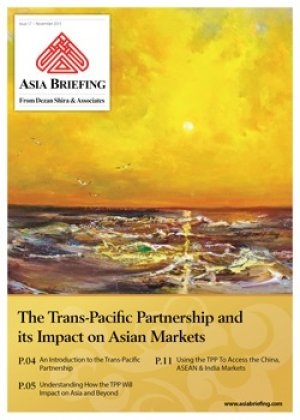Daily Minimum Wage Rates in Thailand to Increase from January 1, 2017
By Zolzaya Erdenebileg
The Thai cabinet on November 22, 2016 approved the recommendations of the Central Wage Committee to increase the daily minimum wage rates by an additional five to 10 Thai Baht (THB) for 69 provinces with effect from January 1, 2017.
This will be the first adjustment in the country’s minimum wage rates since January 1, 2013. Currently, the minimum wage is THB 300 (US$8.39) per day across the country. The current minimum wage rate will be maintained in the eight provinces of Sing Buri, Chumphon, Nakhon Si Thammarat, Trang, Ranong, Narathiwat, Pattani and Yala.
![]() RELATED: Pre Investment and Market Entry Advisory from Dezan Shira & Associates
RELATED: Pre Investment and Market Entry Advisory from Dezan Shira & Associates
In the following 49 provinces, the new daily minimum wage will be THB 305:
Mae Hong Son, Lampang, Nan, Tak, Kanchanaburi, Ratchaburi, Suphan Buri, Phetchaburi, Phatthalung, Satun, Kamphaeng Phet, Phichit, Phrae, Phetchabun, Uthai Thani, Sakon Nakhon, Kalasin, Maha Sarakham, Roi Et, Buri Ram, Surin, Amnat Charoen, Chai Nat, Lop Buri, Nakhon Nayok, Sa Kaeo, Prachuap Khiri Khan, Samut Songkhram, Chanthaburi, Trat, Lamphun, Phayao, Sukhothai, Uttaradit, Bung Kan, Nakhon Phanom, Ubon Ratchathani, Ang Thong, Loei, Nong Bua Lamphu, Mukdahan, Yasothon, Chiang Rai, Phitsanulok, Udon Thani, Chaiyaphum, Si Sa Ket, Nakhon Sawan and Nong Khai.
In the following 13 provinces, the new daily minimum wage will be THB 308:
Khon Kaen, Nakhon Ratchasima, Prachin Buri, Chon Buri, Rayong, Surat Thani, Songkhla, Chiang Mai, Saraburi, Chachoengsao, Krabi, Phangnga and Ayutthaya.
In the following seven provinces, the new daily minimum wage will be THB 310:
Bangkok, Nakhon Pathom, Nonthaburi, Pathum Thani, Samut Prakan, Samut Sakhon and Phuket.
![]() RELATED: Minimum Wages in ASEAN – All You Need to Know in 2016
RELATED: Minimum Wages in ASEAN – All You Need to Know in 2016
With these changes, the average daily minimum wage in Thailand will increase by 1.7 percent with the increase in the capital Bangkok and its vicinity standing at 3.3 percent. The new rates are based on the country’s cost of living index, inflation rate, production cost, labor productivity, national GDP, and the economic and social situation of each of Thailand’s provinces.
|
Asia Briefing Ltd. is a subsidiary of Dezan Shira & Associates. Dezan Shira is a specialist foreign direct investment practice, providing corporate establishment, business advisory, tax advisory and compliance, accounting, payroll, due diligence and financial review services to multinationals investing in China, Hong Kong, India, Vietnam, Singapore and the rest of ASEAN. For further information, please email asean@dezshira.com or visit www.dezshira.com. Stay up to date with the latest business and investment trends in Asia by subscribing to our complimentary update service featuring news, commentary and regulatory insight. |
Annual Audit and Compliance in ASEAN
For the first issue of our ASEAN Briefing Magazine, we look at the different audit and compliance regulations of five of the main economies in ASEAN. We firstly focus on the accounting standards, filing processes, and requirements for Indonesia, Malaysia, Thailand and the Philippines. We then provide similar information on Singapore, and offer a closer examination of the city-state’s generous audit exemptions for small-and-medium sized enterprises.
 The Trans-Pacific Partnership and its Impact on Asian Markets
The Trans-Pacific Partnership and its Impact on Asian Markets
The United States backed Trans-Pacific Partnership Agreement (TPP) includes six Asian economies – Australia, Brunei, Japan, Malaysia, Singapore and Vietnam, while Indonesia has expressed a keen willingness to join. However, the agreement’s potential impact will affect many others, not least of all China. In this issue of Asia Briefing magazine, we examine where the TPP agreement stands right now, look at the potential impact of the participating nations, as well as examine how it will affect Asian economies that have not been included.
 An Introduction to Tax Treaties Throughout Asia
An Introduction to Tax Treaties Throughout Asia
In this issue of Asia Briefing Magazine, we take a look at the various types of trade and tax treaties that exist between Asian nations. These include bilateral investment treaties, double tax treaties and free trade agreements – all of which directly affect businesses operating in Asia.













